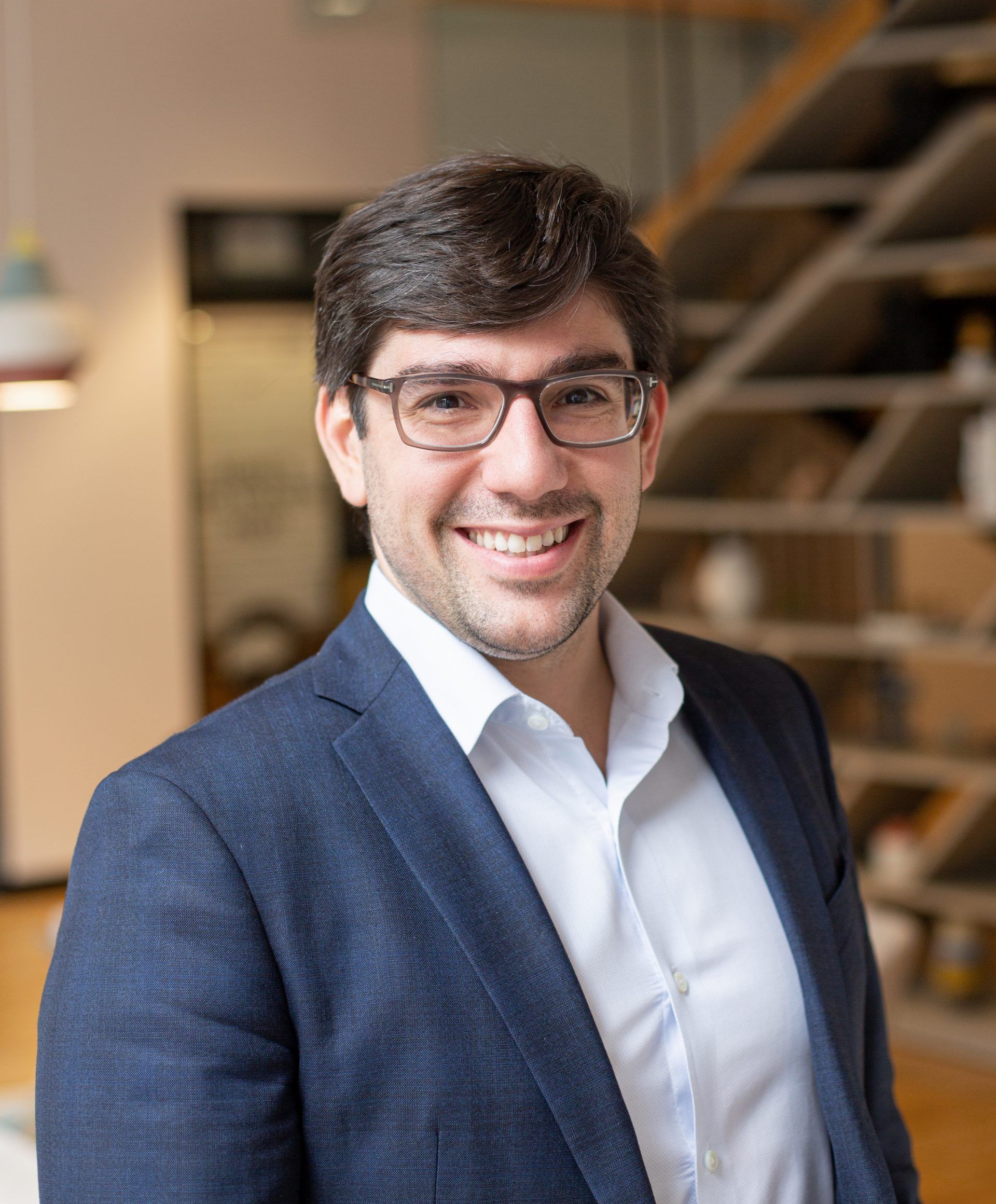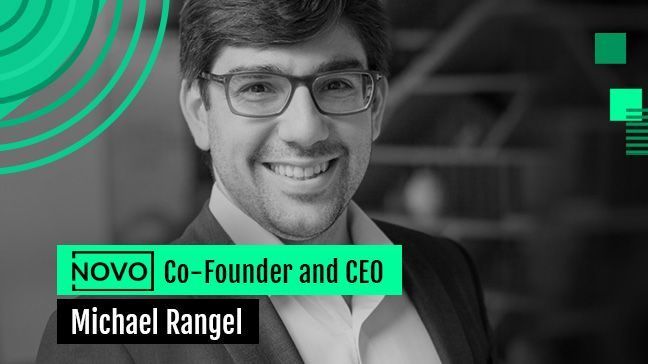Starting a small business is easier than ever. Using only a computer and an internet connection, an entrepreneur can launch a company.
To be successful, though, a business needs the right tools. Those include solutions necessary to send invoices and get paid. To get that started, you need a good bank account.
Novo was built to meet the needs of small business owners. With no hidden fees and easy transfers, it’s the perfect option for entrepreneurs who want a separate account for managing business finances.
Novo founder, Michael Rangel is a startup founder himself. He began building Novo in early 2016 with Tyler McIntyre, a longtime friend who is now the company’s cofounder. Recently, we spoke to Michael and discussed his own thoughts about finance, as well as the always-changing world of banking.
What’s Ahead:
Why Novo?
Novo provides easy online banking with minimal fees. There’s no minimum balance, so you can get started even if you don’t have thousands of dollars rolling in each month.
But what really helps small business owners is Novo’s easy transfers. You can move money back and forth from your other accounts with a tap on a screen. Your customers can also pay your invoices using ACH transfer, TransferWise, checks, and more – all without fees.
Although Novo is an online platform, you can still perform local transactions. You’ll get a debit card for purchases and you can also withdraw cash from local ATMs. Novo will refund any ATM fees you’re charged.
Meet Novo’s founder – Michael Rangel
Michael Rangel came up with the idea to start Novo while considering pursuing his MBA at Columbia University. Together with Tyler, he began working toward building a new business, which launched in 2016 with an invite-only release.
In just a few years, Michael and Tyler have grown Novo to a solid banking platform that attracts both freelancers and small business owners. This experience has given him a unique view of how business banking is changing and where it’s headed in future years.
Money Under 30’s interview with Michael Rangel

We’d love to hear a little bit about your background. What drew you to finance as a career?
I’ve been working since I was a kid. I always liked the freedom that having a few extra nickels gave me, so I worked all throughout school. I first got into finance at the age of 19, where I started working in the mailroom!
I always knew that I was good with numbers, so when I got the opportunity to take the Series 7 certification later that year, I jumped on it. I had my Series 7 certification before I took my first finance class in college and was one of the youngest kids at the time to get it. This kind of solidified my spot in finance, but I always had an itch to do something bigger.
You had an impressive career in finance before founding Novo. What inspired you to start Novo?
A few big things happened in my life that really shook things up and put everything into perspective. First, I was involved in a horrific car accident, where I actually lost my best friend and roommate at the time. I survived after also being ejected from the vehicle, but had a long road of recovery ahead of me.
I had always wanted to launch a business before my days in finance, but I never pulled the trigger as I was always holding out for more. I always thought I needed more knowledge, more money, or more connections, but then I quickly realized there would never be that “right time” to launch a business. I moved up to New York City in 2015 and started taking classes at Columbia University as I thought an MBA program was going to be my next step.
Around that same time, I was talking with a longtime friend of mine about launching something to become the proverbial ‘startup bank’ as we had both experienced the problems with SMB banking in our own right. Fast forward to 2020: he’s now my co-founder and we’ve been building Novo since the beginnings of 2016.
Novo provides affordable, convenient banking to small businesses and freelancers. What do you feel sets your services apart?
Three things: our product, our target market, and our customer experience. We’ve partnered directly with a small community bank to build our own infrastructure. This gives us the ability to customize our product for the Novo audience.
As for our target market, we made a large up-front investment in infrastructure and, as a result, we’ve unlocked the ability to economically service an often overlooked segment, or what we consider mainstream American business owners.
Customer-centricity is one of our core company values and something we take very seriously. A lot of this type of service is reserved for a select few businesses, but we started Novo to address that exact pain point – and it’s a massive one too.
You’ve received kudos for your positive work culture and strong workforce. What do you feel is the key to growing and nurturing a winning team?
The key is to give everyone the autonomy to stretch and grow while offering them the ability to have a seat at the proverbial table. Nothing motivates me more than when someone stretches beyond their comfort zone, takes a calculated risk, and watches their efforts create an impact on the world.
What changes have you seen in small business banking during the time you’ve been in the industry?
To be honest – not very many. Incumbents have been slow movers when it comes to SMB products as they have everything focused on their individual retail products. Even with the introduction of third-party Banking-as-a-Service platforms that allow new challengers to get to market easily, FinTechs that build on top of them are largely stuck building their products from within the same cookie-cutter mold and facing a lot of the same issues that incumbent banks have failed to solve for decades.
SMB banking products have traditionally lagged behind consumer products by five to ten years, but they’ll need to catch up quickly as business owners will increasingly demand the same level of service and innovation from their SMB bank as from their personal one.
The current situation with COVID-19 is unprecedented for this generation’s small businesses. What do you think they can do to make sure they can reopen once this is over?
It’s difficult to offer concrete advice when faced with the unknown, but I think COVID has fundamentally changed the way we all operate. We do things differently now and, in a lot of cases, in a way that we might not have ever done before.
This has forced the acceleration in digital adoption trends across every industry. Specifically, in banking and e-commerce, I do not think we will ever turn back. I believe the transition to digitization is more important now than ever before and that every business should take a long hard look at how they do it themselves if they haven’t already.
What requests is Novo seeing from your small business customers during this time?
What people love most about our product are the custom integrations that we have into the different tools they already use. We put a huge focus on the customer by conducting regular customer interviews across all parts of the product/business.
What books/publications/podcasts can you recommend to our readers that have been particularly useful to you?
Books (in no particular order): The Ride of a Lifetime, Built to Last, Stillness is the Key, Measure What Matters, Zero to One, Leaders Eat Last, Grit, and many others. As for podcasts, I like How I Built This.
Tell us a little about your vision for the future of small business banking. Do you think there will be more individuals starting their own businesses and freelancing in the coming years?
The future of small business banking is very different from what you see today. We believe that the future of banking, in general, will be invisible. What does that mean? Well, it means that the end consumer would never have to interact with his/her bank because everything just works in the background. Similar to how when you get in an Uber you no longer have to exchange a form of payment with the driver. You just get out and get on with your day, while Uber takes care of the money for you.
How does this translate to banking? The financial world is going to get more interconnected, especially for small businesses, where the dizzying number of financial tools a business owner must leverage to run a business will begin talking to each other, even if they are across different brands. In a world not too far from now, banks should be able to detect potential trouble before the trouble even happens and be able to extend solutions to help that business owner avoid a lot of headaches and potential fees.
As far as the market size itself, yes, there will be more people starting their own businesses and/or freelancing – a lot more. The line between individual retail consumers and small businesses is the most blurred it has ever been. Small businesses are smaller now than they’ve ever been in history. There are tools that simplify formation, and solutions that can get someone incorporated in a few taps on their mobile phone. It’s easier to set something up now and less of a financial burden on the owner than ever before. So what is holding people back? Usually, it’s a healthy dose of fear.
What advice do you have for anyone thinking about starting a business?
As I mentioned above, fear often holds people back. Fear is a super interesting thing to me. Why? Because it’s 100% self-imposed. Everyone has fears, especially entrepreneurs who take the plunge. What if I run out of money? What if customers don’t like my product? What if my competitor outdoes me? What if there is a global pandemic that stops the world as we know it? What if…the list is endless.
But, for the person who actually takes the plunge…there is something different about them. It could be they have a chip on their shoulder, they want to prove someone or something wrong, they have a burning desire to build something larger than themselves. For these people, they think differently about fear and they actually use fear as a motivator to propel them forward. Their ambition is so much greater than their fear that it almost pales in comparison.
So, my advice, which is way easier said than done, is don’t let that fear act as a deterrent. Use that fear to guide you directionally in your life and if/when you decide to pull the trigger, do not just dip your toe in the water. Get ready to dive in headfirst.
Who in your life has been the most instrumental in teaching you about money management?
My parents, 100%. My father’s family fled Cuba when he was four years old and had to start from nothing. While my mother, also from a Cuban working-class family, started working when she was 13 at Burger King to help put herself through school.
Fast forward to the present day and they are both successful financial advisors in their own right, who came from nothing while creating an amazing world for themselves and their families. They have both evolved into such amazing human beings and the best parents possible while being a true testament to the American Dream
What’s the best advice you’ve received (not necessarily money-related) that has shaped how you lead your life?
One of my long-time mottos has always been: do it for the story. That thinking may have taken a different meaning with the evolution of social media, but the core of it is still there and it is as relevant as ever. I treat life as an adventure and Novo has been an incredible adventure for me, where we have taken paths that many people may not have taken.
What’s your top personal finance tip?
Cash is King. If you don’t have it, save until you do.
What is the financial book/website/podcast that has most influenced you?
It’s not necessarily about finance, but more life in general. My dad gave me this book when I was a little kid and it’s always stuck with me when thinking about goals and life: Who Moved My Cheese?
What piece of wisdom would you give your 20-year-old self about managing money?
Life is all about compound interest. Different jobs position you to compound that interest in different ways, but to my younger self, I’d say, “Don’t optimize for a paycheck. Optimize for learning and exposure to the world.”
The compound interest you develop when you are young can set you on a wildly different trajectory later in life. So, make sure you can feed yourself and take care of your responsibilities, but don’t be afraid to take risks and swing big.
Summary
Online banking is changing the way consumers and businesses manage their money. Novo’s features give freelancers and small business owners the tools they need to get started accepting payments and making purchases. As the landscape continues to change, Michael Rangel is committed to continuing to look out for small business owners.
Learn more about Novo or read our Novo review here.


